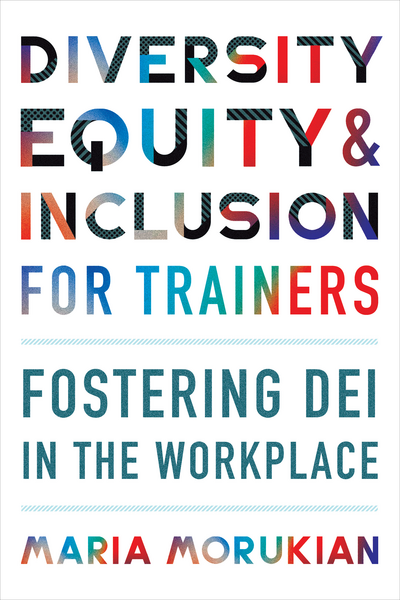ATD Blog
A Road Map for Diversity, Equity, and Inclusion for Trainers
Tue Jan 18 2022

While much has been written about DEI for human resource professionals to help them hire, retain, and advance employees from all walks of life, practical guidance for trainers trying to learn how to integrate DEI into their work has been scarce. As a DEI trainer, you have forged your own way and learned as you went. With Diversity, Equity, and Inclusion for Trainers: Fostering DEI in the Workplace, the need for DEI trainers to go at it alone comes to an end. Expert facilitator Maria Morukian provides the guidance you need to develop the knowledge and skills required for DEI training.
1. What inspired you to write this book?
I was fortunate enough to have been guided and mentored by some of the most talented diversity, equity, and inclusion (DEI) practitioners in the field. As I advanced in my career, I came across many trainers and talent development (TD) professionals eager to contribute to DEI work but unclear where to attain the skills to do it effectively. 2020 brought a renewed focus on DEI work, and quite honestly, the demand for effective DEI practitioners far outweighs the supply of qualified professionals who can guide this work in a meaningful way. This book will help to close the gap and lead to true progress and lasting change.
2. Who will benefit from this book?
While this book is intended primarily for training and talent development professionals, it is also a valuable resource for accidental trainers and anyone who is engaged in DEI efforts for their organization.
There is no other book like this on the market. It focuses on the full suite of skills that anyone involved in training and learning needs to implement real change for DEI. It takes the reader through the process of designing and delivering effective DEI training, from assessment to evaluation. It goes beyond DEI-specific training skills to focus on how training professionals can help lead organization-wide DEI change efforts by embedding DEI concepts and skills into the entire learning continuum. It also challenges readers to consider their own identity lenses and biases.
3. What are the trends you are seeing in your work as a DEI consultant?
I see three important trends:
Accountability. Organizations are increasingly being held accountable for more than just compliance with federal laws around discrimination or harassment. The workers of today and tomorrow demand not only a more diverse representation of people at every level of the organization. They expect that their workplace will visibly and intentionally foster inclusive cultures. They want to see observable efforts to ensure equitable practices in terms of hiring and advancement.
Advocacy. We’ve seen a lot of employees and consumers push publicly for organizations to commit to social change in terms of activism and advocacy. Corporate leaders are being held to task to not only make public statements in the wake of catastrophic events, but then to commit to action. In the last two years, there has been a sea change in terms of what is permissible to talk about at work, and organizations are increasingly supporting conversations around issues like racial justice and gender identity.
Antipathy. Leaders are struggling to figure out how to do this and navigate the ideological polarization that is continuing to grow in our country and around the globe. As people have increasingly become entrenched in their ideological echo chambers, it’s like we’ve all lost the ability (or willingness) to seek connections and common ground. Then you add the incredible toll the Covid-19 pandemic has taken on all of us. It’s overwhelming. People are exhausted and suffering. If we want this work to be sustainable and continue to be successful in making actual progress, we must create space for compassionate conversations where folks can seek common ground and feel heard.
4. What are some things trainers and TD professionals can do to be more effective in DEI work?
Read this book! Seriously, I would boil it down to three key foundational elements for trainers:
Do your own work. Trainers are human beings, which means you have you own complex identities, experiences, and biases you bring with you into every situation. Anyone invested in DEI needs to bring a true willingness to always be in learning mode. You must embrace the Buddhist teaching of being an endless learner. Don’t dive into DEI training until you take time to study these concepts and explore your DEI identity story. Reflect on how implicit biases may influence your decisions and actions.
Embrace the mess. There is no easy recipe for doing DEI. We’re all struggling to figure out how to successfully disrupt systems that have been set up to provide advantages to certain people over others for generations. It requires a long-term focus and a willingness to constantly challenge and change the status quo. Being a disrupter requires you to be willing to experiment, mess up, learn, and try again.
DEI work is also messy on an interpersonal level, because you are pushing people outside their comfort zones. This is true for everyone—especially for those who are being asked to face their societal privileges, often for the first time. It’s even messier because DEI issues have become politicized. Concepts have been twisted to instill anger and fear, and people will be bringing those emotions with them into any learning situation. Trainers need to be ready to help learners accept the discomfort and seek common ground with those they have been told to perceive as the “other.”
Build a community. This work takes a toll—emotionally, mentally, physically, and spiritually. You’re exploring your own identity lenses, biases, and privilege, which can be liberating but also exhausting. Not only that, you are facilitating a collective learning experience, navigating the emotions of a roomful of people being asked to get vulnerable with one another and explore their own identity lenses, biases, and privileges. DEI trainers need to take care of themselves and one another. Build a community of supporters and partners to be in this work with you. Don’t try to go at it alone. You’ll burn out. That’s why I often work in collaboration with one or more partners in my training work, people with whom I share a common vision and values, who I know will offer encouragement, feedback, and support.
About the Author
Maria Morukian is a recognized organization development practitioner specializing in training, coaching, and facilitation with a focus on diversity, equity, inclusion, and intercultural competence. Maria is the president of MSM Global Consulting and an adjunct faculty member at American University’s School of International Service. She previously served in leadership and organization development positions at the US Office of Personnel Management’s Federal Executive Institute and the US Department of State. She has worked with such diverse clients as PBS Distribution, the National Park Service, National Institutes of Health, the World Bank, and the Association for Animal Welfare Advancement. Maria is a sought-after speaker and has presented at numerous events for organizations such as TEDx, the Forum (on workplace inclusion), ATD, Blacks in Government, and Ellevate Women’s Network_._ Maria is host of the podcast Culture Stew, which focuses on the multidimensionality of identity and best practices in diversity, equity, and inclusion.
About ATD and ATD Press
The Association for Talent Development (ATD) is the world’s largest association dedicated to those who develop talent in organizations. ATD’s members come from more than 120 countries and work in public and private organizations in every industry sector. ATD Press publications are written by industry thought leaders and offer anyone who works with adult learners the best practices, academic theory, and guidance necessary to move the profession forward. For more information, visit td.org/books.

Diversity, Equity, and Training for Trainers: Fostering DEI in the Workplace
ISBN: 9781953946058 | 320 Pages | Paperback
https://www.td.org/product/book--diversity-equity-and-inclusion-for-trainers/112204
To order books from ATD Press, call 800.628.2783.
To schedule an interview with Maria Morukian, please contact Kay Hechler, ATD Press senior marketing manager, at [email protected] or 703.683.8178.
